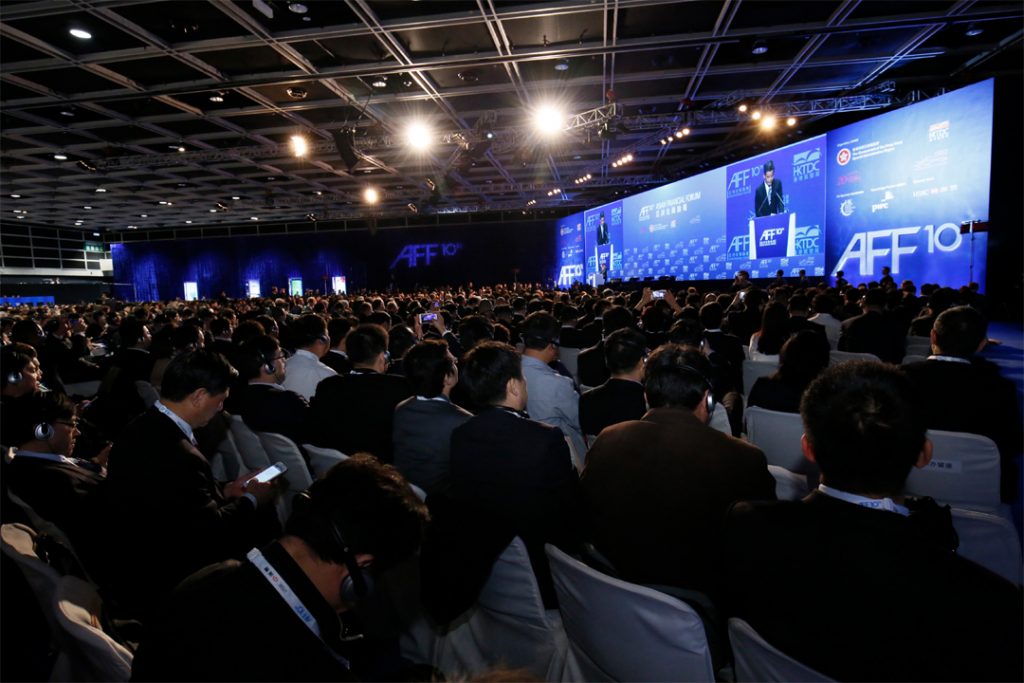HONG KONG — The 10th edition of the Asian Financial Forum (AFF), co-organised by the Hong Kong Special Administrative Region (HKSAR) Government and the Hong Kong Trade Development Council (HKTDC), concluded today at the Hong Kong Convention and Exhibition Centre (HKCEC).
The two-day forum welcomed more than 2,800 financial and business leaders, policymakers, investors and high net-worth individuals from 50 countries and regions. Around 100 high-level speakers shared insights into global economic trends as well as investment opportunities in Asia for the coming year.
The AFF, which included a special 10th Edition Cocktail Reception and more than 620 one-on-one matchmaking meetings, presented a dynamic platform for businesses to explore investment opportunities in the financial sector and hear from thought-leaders in the industry.
Uncertainty amidst the change of US administration
A number of polling sessions were conducted during the AFF to collect insights and intelligence from participants on various economic issues and development policies.
Polling results indicated that nearly half of the attendees (49%) are neutral on the outlook for the global economy this year; among the remaining participants, more (31%) are pessimistic compared to those who are optimistic (20%) towards the economy.
READ ALSO: 10th Asian Financial Forum Opens in Hong Kong
However, the percentage of participants voting pessimistic is lower than at last year’s AFF, indicating business expectations have slightly improved. Forty-five per cent of attendees think the biggest global economic risk is the policy direction of the new United States administration, while 19 per cent of attendees identified heightened geopolitical tension as another looming risk.
Belt and Road opportunities
On-site polling results also showed that the highest number of attendees (38%) think China will offer the best investment returns in 2017, an increase of 7.7 percentage points compared to the same poll last year.
Twenty-six per cent of attendees said the US is likely to offer the best return on investment. Meanwhile, 15 per cent and 10 per cent expect good return from Southeast Asia and India respectively.
However, more than half of the attendees (52%) expect that China’s GDP growth will slow to between six and 6.5 per cent; 36 per cent of attendees think annual growth will exceed 6.5 per cent. Twenty-three per cent of attendees said the main growth engine is increasing domestic demand (23%), followed by economic liberalisation and structural reform (18%) and proactive fiscal policies (17%) and the Belt and Road Initiative (17%). Seventy-seven per cent of attendees expect the Belt and Road Initiative to yield substantial economic benefits to most, if not all, ASEAN countries.
The Belt and Road Initiative is creating numerous investment opportunities, especially in infrastructure financing, for countries and regions along the Belt and Road routes. To examine this topic, Hong Kong’s Financial Services and the Treasury Bureau and Hong Kong Monetary Authority Infrastructure Financing Facilitation Office (IFFO) co-organised a workshop on “Infrastructure Financing in Asia: Prospects and Challenges”.
The panel was chaired by Chief Executive of the Hong Kong Monetary Authority, Norman TL Chan and invited speakers from China’s Ministry of Finance, Astana International Financial Centre, Canada Pension Plan Investment Board, CLP Holdings Limited, HSBC and Macquarie Group Asia to analyse opportunities and challenges in infrastructure financing in Asia.
Business opportunities for different market sectors
One of the key themes of the AFF was Hong Kong’s role in the global market amidst economic challenges and opportunities. This morning’s breakfast panel “Positioning Hong Kong in the New World Order”, sponsored by the Financial Services Development Council, tapped into this theme.
MTR Corporation Limited Chairman Prof Frederick Ma discussed Hong Kong’s role on the Belt and Road; Goldman Sachs Asia Bank Limited Chairman Tim Freshwater shared insights into green financing and Lei Zhang, Founder, Chairman & CEO of Hillhouse Capital Management Group spoke about how Hong Kong could leverage its financial infrastructure to develop Fintech. Other AFF workshops covered topics including green economy, China-India economic cooperation, personal wealth management, Fintech and insurance.
At today’s keynote luncheon, Dr Raghuram Rajan, former Governor of the Reserve Bank of India and Distinguished Service Professor of Finance at The University of Chicago Booth School of Business, analysed how central banks of different countries can devise appropriate currency policies in the current environment and ways that investors can cope with the changing policy and regulatory landscape.
Professional insights into investment
For a second consecutive year, the AFF hosted the Global Investment Summit, inviting Tao Zhang, Deputy Managing Director, International Monetary Fund, to deliver the opening speech, while a number of other high-level guest speakers explored investment opportunities in ASEAN and the Middle East. The Global Investment Zone allowed attendees to learn about investment opportunities and projects from 13 countries including Germany, Iran, Israel, Poland, South Africa, US and Vietnam.
The HKTDC also jointly organised the AFF Deal Flow Matchmaking Session with the Hong Kong Venture Capital and Private Equity Association. The session this year arranged more than 620 one-on-one meetings for over 450 investors and project owners, involving more than 450 projects.
Project presentation and interaction sessions focussed on four high potential sectors: food and agriculture, environment and production technology, Fintech and infrastructure investment. The Financial and Professional Advisory Services Zone provided free on-site finance consultation services from representatives of financial institutions, accounting firms, legal firms and business consultation companies.
The AFF is also a flagship event of the International Financial Week, which features a wide array of events covering topics including connectivity, private investment, and alternative investment, highlighting Hong Kong’s strengths as an international financial centre and creating business partnership opportunities. – BusinessNewsAsia.com
